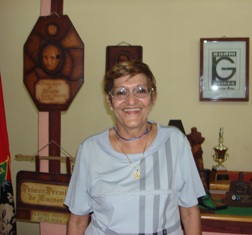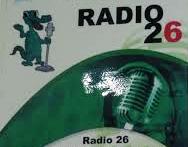Appointing a new director at a station like Radio Havana Cuba was among such decisions. I listened carefully to the outgoing director’s arguments, Peter Rojas, a great journalist and leader who received new assignments. And his proposal was a surprise for the young female journalist with no previous experience in management. I thought about it and talked to her. I witnessed all respected her as Secretary of the Party and I took that decision because it broke schemes at the national level, from where only men were considered to become directors.
And Milagro could make it. She was the head of Radio Havana Cuba, for more than 15 years, doing a successful job, which she left due to an unfortunate accident.
Milagro herself is in front of me and as she is a good journalist and broadcaster, I have asked her to talk about her life. I just give a hint: WHY IS NUMBER SIX YOUR LUCKY NUMBER?
MH: I was born on a Thursday, September 6, 1951 after six o’clock in the afternoon, and the truth is that the number six has been pursuing me until today because seven years ago, exactly on February 6, I had a household accident that almost killed me; however, as I am not exactly a pessimist person, I think that this is really my lucky number.
I did not get into journalism by accident; I really liked it ever since even though in my native Pinar del Río I barely knew about the world I was going into while moving ahead with my career. I finished it at the University of Havana and my graduation would always be a major milestone in my life because the grad ceremony tool place at the ancient Plaza Cadenas and my parents attended feeling proud of watching their two daughters becoming professionals, and because for the first time I listened to Carlos Rafael Rodriguez´ speech in flesh, which had a tremendous impact for me in my professional life even thirty-seven years after I heard it.
JB: You were a Pioneer despite rumours pioneers were supposed to be returned from Russia became in “sardine cans.” …
MH: My family was made up of two humble and hard working persons who loved each other very much and if they could not provide us a material wealth, they surpassed all the expectations with the love they rendered us.
I remember I wanted to teach to read and write in the literacy campaign and as I was barely nine years old my father rejected I could join the brigades, but helped me to teach a person who used to come every day to my place. Since then I’ve always felt that there is a teacher in me and if at any time I take the decision to teach, things would go right for me.
I was one of the top five pioneers to swear in Pinar del Río although many of my parents´ friends tried to discourage my father because as “foreign radio stations were announcing,” “the young girls were to be taken to Russia and to be brought back eventually in sardine cans. ”
I am really very glad my father had not been guided by those counterrevolutionary fears because those pioneer times brought me to Havana for the first time, and visited Almendares Park and the Havana Zoo; I could dance on a real stage after my first artistic steps in my neighbourhood and especially in the our house backyard;, and because I could meet great people who taught me to love Cuba most, and above all, to love the Revolution.
Then when I started high school, I was accepted as a UJC member. I was a member for fourteen years until I became a Party member at 28 years old; it has been a “whole life” devoted to my revolutionary commitment that undoubtedly made me a better person.
JB: Your professional life has taken place in Pinar del Rio, the People’s Republic of Angola and Havana, am I right?
MH: When I finished college in 1973 I went back to Pinar del Rio, to learn about what was it was really seeking a piece of news and turns it into information. I spent five years there allowing me to learn more about my little homeland and come across wonderful people like Malagones brothers, those early militiamen in Viñales Valley for whom our Commander in Chief has always felt a deep respect and high esteem. I also had my first field training professor, the excellent journalist Manuel Yepe Menéndez, and I got so many friends who over the years, are still with me.
Just in 1978 I got married and travelled to Havana for my new job. That was my second time on the radio, on the fourth floor of a building located on P Street and 23rd Street, the headquarters of the then Information Division and Clock Radio Station (Radio Reloj), where I had my pre-professional practice years ago; there I had the opportunity to know who would be one of my dearest professors in this professional world, Antonio Caso Clúa, Casa de Las Americas Award holder, and my best friend without the shadow of a doubt.
It was hard for me to imagine that just at the Clock Radio Station, I would be working as now where I have found a wonderful staff and where I would expect to have my retirement. In 1980 I had the opportunity to go to the People’s Republic of Angola as a journalist for Verde Olivo in International Mission, an extraordinary experience that marked my personal and professional life. There I strengthened my marriage and my daughter Vanessa was conceived and there I had the privilege to meet who would be my dear brother forever, the late cartoonist Tomás Rodríguez Zayas, Tommy.
When I returned, and the Information Division did not exist and Radio Rebelde was merged with the former Liberation Radio to give life to a new station with higher goals and there I had a job. remember that in 1984 ICRT brought together a team of Cubans professionals which would be responsible for the establishment of a station in response to the ill-named Radio Martí and when Taino Radio Station came into life, devoted to tourism, I was the scriptwriter along with Mercedes Roseberry, my friend and colleague, the Two O’clock Panorama that was aired with Manolo Ribeiro´s unforgettable.
My time at Taino radio station was really a short-lived period because in 1986 I joined a team directed by the excellent journalist Guillermo Santisteban at Radio Havana Cuba, where after three years I became the
General Director with an unconditional love until 2005 when I was released from that duty due to an accident.
JB: What impact did Radio Havana Cuba have upon your personal and professional life.
Radio Habana Cuba was one of the most beautiful things I’ve ever had in my life. It is – as I usually say – my third child because I feel happy for its successes and its ups and downs; with that staff I learned to enjoy the pleasure of working as in a family. I Always remember that some job mates close to me indicated that within my mistakes there was not one related to closing a door to a partner while following any scheme of work, as implemented over the years that I was secretary general of a Party cell at the radio station, and they were right.
Then, when life played a trick on me and instantly I was on the verge of death. From this staff I got the impetus to keep fighting, a helping hand not to feel helpless and the affection around me as an iron shield helped me to survive the crisis and move on.
Form my time at Radio Havana Cuba there are many things to write, but without doubt the most memorable experiences had to do with the campaignaround the world for the liberation of South African leader Nelson Mandela, and the news coverage on US-led invasions to Panama and the Middle East. From my first assignment I keep as a treasure in the heart, the meeting with Fidel in Raúl Castro´s office, then the Minister of the Revolutionary Armed Forces, and from the second, the incredible effort made by journalists, broadcasters and technicians of the stationin order to get another view of the war against Iraq away from the vision on CNN’s information monopoly.
In Radio Habana Cuba I met amazing people as professionals and as human beings, some of them are no longer with us but without doubt, they are alive in my mind. Angel Hernández Iñiguez Barceló, Orlando Castellanos, Dora Guillén and Zayde López are some of them, they taught me that in journalism every day you learn something and one you should get used to criticism with modesty because “it is better that errors get pinpointed at home than on air “.
During my many times at work heading the Cuban international radio station l learned a lot about journalism as well as short-wave broadcasting, something I deeply feel proud of.
JB: Milagro, you are so talkative and such a professional journalist that you brilliantly anticipate my questions. But we have not spoken about something. Tell me more about your family?
MH: My daughter Vanessa says that her mother’s favourite pastime is to be visited by her friends and she is right: I really enjoy these people I love come to my house to share a cup of coffee among my plants, with a panoramic view to the sea before our eyes and some embroidery in my hands.
My husband, with whom I have shared 33 years of my life, and I had a daughter but together we have had six sons and daughters and so far seven grandchildren and a great-granddaughter. They are our greatest treasure and the subject of many plans together.
All have supported me in my profession and they have never been an obstacle for me to address a task as a leader and afterwards as a journalist.
Together we move on our path through life without any burden as far as our age is concerned because around every corner there appears a future project making your eyes shine and your heart beat a little faster.
JB: This is, in brief summary, the life of a woman, one of the best directors that have ever been in our country’s national radio, an example for Cuban women of our times.



